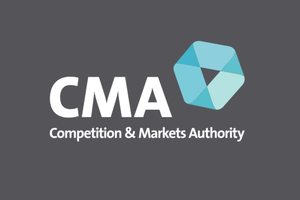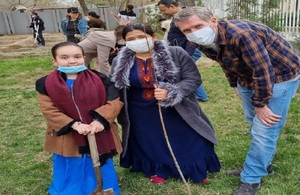DLUHC Secretary of State’s update on Ukrainian Sponsorship Scheme
Mr Speaker, with your permission, I would like to make a statement on our government’s response to help those fleeing the conflict in Ukraine.
This government, this House, indeed everyone in the United Kingdom, continues to be in awe of the bravery of the people of Ukraine. They are victims of savage, indiscriminate, unprovoked aggression. Their courage under fire and their determination to resist inspires our total admiration.
The United Kingdom stands with the Ukrainian people.
My Right Honourable Friend the Defence Secretary has been in the vanguard of those providing military assistance. The Foreign Secretary has been co-ordinating diplomatic support and, with the Chancellor and the Business Secretary, implementing a new, tougher than ever, sanctions regime. The Foreign, Commonwealth and Development Office and the Home Office have also been providing humanitarian support on the ground to Ukraine’s neighbours, helping them to cope with the displacement of hundreds of thousands of people.
But more can, and must, be done.
To that end, My Right Honourable Friend, the Home Secretary, has already expanded the “family route”.
She has also confirmed that from tomorrow, Ukrainians with passports will be able to apply for UK visas entirely online, without having to visit Visa Application Centres.
As a result, the number of Ukrainians now arriving in this country is rapidly increasing and numbers will grow even faster from tomorrow.
We also know however, that the unfailingly compassionate British public wants to help further.
‘Homes for Ukraine’ Scheme
Which is why Mr Speaker, today we are answering that call with the announcement of a new sponsorship scheme, ‘Homes for Ukraine’.
I’d like to thank my Right Honourable Friend the Home Secretary, officials in the Home Office, in my own department and across government for their work over the course of the last days and weeks in order to ensure that we can stand up the scheme as quickly as possible.
And in particular, I would like to thank My Honourable Friend Richard Harrington, now Lord Harrington of Watford. His experience in ensuring that the Syrian Refugee Resettlement programme was a success will prove invaluable in making sure that we do right by the people of Ukraine.
The scheme that he has helped us to design draws on the enormous goodwill and generosity of the British public, and our proud history of supporting the vulnerable in their hour of greatest need.
The scheme will allow Ukrainians with no family ties to the UK to be sponsored by individuals or organisations who can offer them a home. There will be no limit to the number of Ukrainians who can benefit from this scheme.
Requirements
The scheme will be open to all Ukrainian nationals or the immediate family member of a Ukrainian national who were resident in Ukraine prior to 1 January 2022.
They will be able to live and work in the United Kingdom for up to 3 years. They will have full and unrestricted access to benefits, healthcare, employment and other support.
Sponsors in the UK can be of any nationality, with any immigration status, provided they have at least 6 months’ leave to remain within the UK.
Payments
Sponsors will have to provide accommodation for a minimum of 6 months and in recognition of their generosity, the government will provide a monthly payment of £350 to sponsors for each family whom they’ve got.
These payments will be tax free, they will not affect benefit entitlement nor council tax status.
Ukrainians arriving in the United Kingdom will also have access to the full range of public services – doctors, schools and full local authority support.
Security
Of course we want to minimise bureaucracy and make the process as straightforward as possible while also doing everything we can to ensure the safety of all involved.
Sponsors will therefore be required to undergo necessary vetting checks and we are also streamlining processes to security assess the status of all Ukrainians who will be arriving in the United Kingdom.
Launch of expression of interest webpage
From today anyone who wishes to record their interest in sponsorship can do so on GOV.UK and the webpage has gone live as I speak. We will then send any individual who registers further information setting out the next steps in this process; we will outline what is required of a sponsor and we will set out how sponsors can identify a named Ukrainian individual or family, who can then take up each sponsorship offer.
Phased response
Because we want the scheme to be up and running as soon as possible, Homes for Ukraine will initially facilitate sponsorship between people with known connections.
But we will rapidly expand the scheme in a phased way, with charities, churches and community groups, to ensure that many more prospective sponsors can be matched with Ukrainians who need help. And we are of course also working closely with the devolved administrations to make sure that their kind offers of help are also mobilised.
I know that all concerned want to play their part in supporting Ukrainians who have been through so much to ensure they feel at home in the United Kingdom. I am committed to working with everyone of goodwill to achieve this.
Conclusion
Mr Speaker, our country has a long and proud history of supporting the most vulnerable during their darkest hours.
We took in refugees fleeing Hitler’s Germany, those fleeing repression in Idi Amin’s Uganda and of course those who fled the atrocities of the Balkan wars. More recently we have offered support to those fleeing persecution in Syria, Afghanistan and Hong Kong. And we’re doing so again with Homes for Ukraine.
We are a proud democracy. All of us in this House wish to see us stand and uphold our values, and stand shoulder-to-shoulder with our allies and to offer a safe haven to people who have been forced to flee war and persecution.
The British people have already opened their hearts in so many ways.
I am hopeful that many will also be ready to open their homes and help those fleeing persecution find peace, healing and the prospect of a brighter future.
And that is why I commend this Statement to the House.

